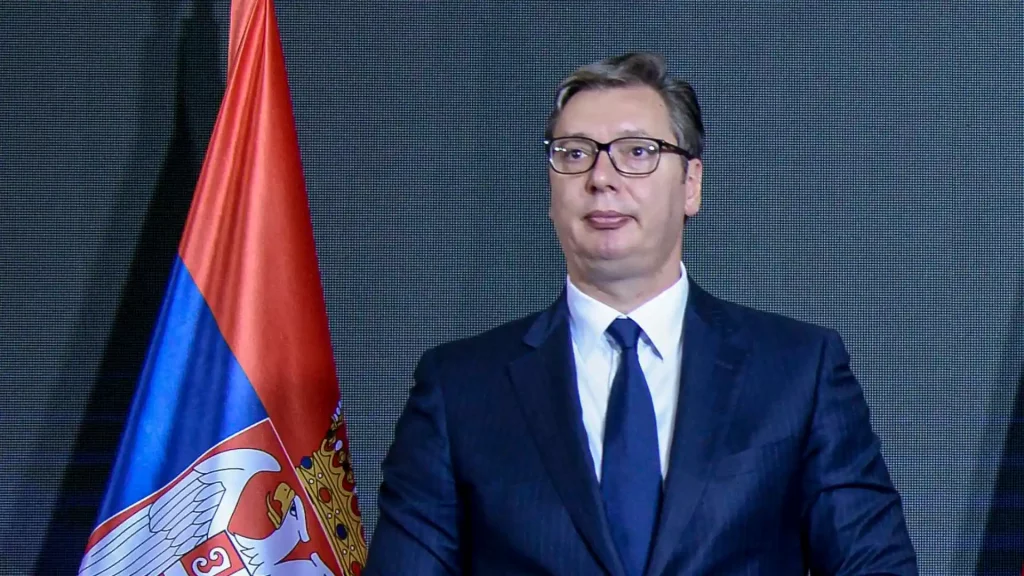The Serbia Against Violence coalition, or SPN, emerged as a response to demonstrations against President Vucic and the SNS party
In a decisive moment for Serbian politics, President Aleksandar Vucic has claimed victory in the recent snap parliamentary elections, positioning his Serbian Progressive Party (SNS) for an anticipated absolute majority. Projections suggest the SNS will secure nearly 47% of the vote, a testament to its enduring influence in a nation that has witnessed three elections in the past three years.
The electoral landscape, marked by a complex interplay of political forces, reveals a resilient political powerhouse in the form of the SNS. Vucic’s declaration, wearing a grey sweater and flanked by Prime Minister Ana Brnabic and Bosnian Serb leader Milorad Dodik, underscores the party’s narrative of stability and progress.
While not a candidate himself, Vucic emphasized his commitment to securing an absolute majority for his “Serbia must not stop” election list. The president’s announcement comes after the results from Serbia‘s 8,273 polling stations confirmed the SNS’s lead. However, projections in the capital, Belgrade, suggest a closer margin, setting the stage for a competitive arena in Sunday’s local elections.
Belgrade holds particular significance as the opposition parties, united under the banner of Serbia Against Violence, aim to challenge the ruling party’s dominance. The loose opposition alliance, forged in the aftermath of mass shootings in May that triggered significant protests, is united against what they perceive as a culture of violence promoted by the ruling party.
The Serbia Against Violence coalition, or SPN, emerged as a response to demonstrations against President Vucic and the SNS party. The protests, fueled by the perception of a culture of rhetorical and physical violence, reflect a desire for change among sections of the Serbian populace.
Despite the opposition’s spirited efforts, the projections favor the SNS, creating uncertainty for the SPN. President Vucic dismissed claims of irregularities as attempts to sow chaos, panic, and mistrust. The ruling party’s narrative of progress and stability appears to resonate with voters, contributing to its continued stronghold.
As the nation grapples with economic challenges, including high inflation reaching 8% in November, the SNS remains an appealing choice for voters. The opposition, led by figures like former Belgrade mayor Dragan Djilas, sees the elections as a harbinger of change, with people expressing a desire for normalcy without crime and corruption.
The elections have brought to the forefront allegations of public resource misuse by the SNS and concern about a lack of pluralism in Serbia. Election monitors reported irregularities, including voters being transported from Bosnia-Herzegovina to cast ballots in Belgrade, heightening the complexity of the political landscape.
With a turnout estimated at 59.1%, the elections reflect the intricate political dynamics in Serbia. The country, a candidate for European Union membership, faces external pressures to normalize relations with Kosovo. The longstanding issue remains a diplomatic challenge, with Serbia refusing to recognize Kosovo’s unilateral declaration of independence in 2008.
President Vucic, under pressure from both the EU and the US, navigates the delicate task of addressing Serbia’s stance on Kosovo. The issue involves not only geopolitical considerations but also historical complexities that shape the nation’s identity.
The final results and the allocation of parliamentary seats will determine the shape of Serbia’s political landscape. As the nation grapples with internal reforms and navigates regional geopolitics, the elections underscore the nuanced aspirations and challenges facing a country at the crossroads of its political destiny. The resilience of the SNS and the aspirations of the opposition converge in a pivotal moment in Serbia’s political history.
